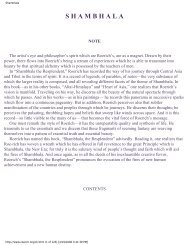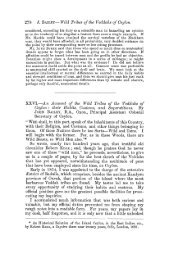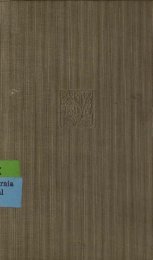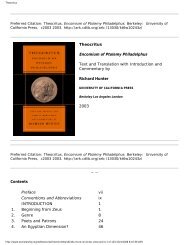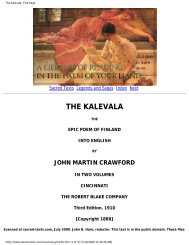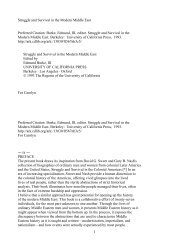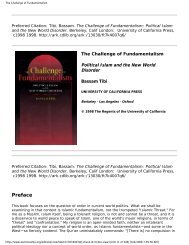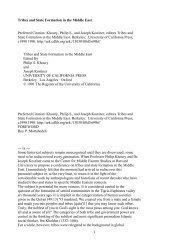Between Two Worlds Kafadar.pdf
Between Two Worlds Kafadar.pdf
Between Two Worlds Kafadar.pdf
Create successful ePaper yourself
Turn your PDF publications into a flip-book with our unique Google optimized e-Paper software.
ev. ed. (Ankara, 1968), 26.<br />
25. <strong>Two</strong> related versions of this vale are studied in Wittek, "The Taking of the<br />
Aydos Castle: A Ghazi Legend and Its Transformation," in Arabic and Islamic<br />
Studies in Honor of Hamilton A. R. Gibb, ed. G. Makdisi (Cambridge, Mass.,<br />
1965), 662-72.<br />
26. Dusturname * , 84-85: "gorisup * esenlesup * qardas * olur."<br />
27. Ibid., 106.<br />
28. Ibid., 107. According to Gregoras, the Byzantine chronicler (cited in Bryer,<br />
"Greek Historians" 477), Kantakouzenos had strong brotherly feelings for Umur<br />
Beg so that the two were like Orestes and Pylades.<br />
29. For a comparison of the Ottoman chronicles and the Dusturname * with regard<br />
to this episode, see E. Zachariadou, "Yahshi Fakih and His Menakib," forthcoming<br />
in the proceedings of the Turkish Historical Association Congress held in 1989.<br />
30. According to Islamic prophetology, revelations to four prophets — David,<br />
Moses, Jesus, and Muhammad * — were given written form; the "four books" thus<br />
subsume the scriptures of all of the Abrahamic religions. "Seventy-two" is a<br />
standard number for "ail" the peoples or languages. In the later and more<br />
"historical" vita of the sailor-gazi Hayreddin * (Barbarossa, d. 1546), too, one<br />
of the protagonists is distinguished by knowing foreign tongues, among which<br />
Greek is particularly emphasized: Il "Gazavat-i * Hayreddin * Paša" di Seyyid<br />
Murad * , ed. Aldo Gallotta (Naples, 1983), 121-v. Because he knew other<br />
languages and because he was such a good conversationalist, "wherever Oruç Re'is<br />
* [the elder brother of Hayreddin * Barbarossa] went, old and young infidels<br />
gathered around him and conversed with him? The modem Turkish publication, not a<br />
scholarly edition but based on some manuscripts not used by Gallotta, mentions<br />
that Oruç knew "all languages." See Barbaros Hayreddin Pasanin * Hatiralari, ed.<br />
E. Duzdag * (Istanbul, 1973), 1:65.<br />
31. The citations are from Stephen J. Greenblatt's "Improvisation and Power" in<br />
Literature and Society , ed. E. Said (Baltimore, 1980), 57-99. Even though the<br />
author of this brilliant article is cautious enough to note that this kind of<br />
empathy is not exclusively a Western mode, he still states (61) that it is<br />
characteristically Western and "greatly strengthened from the Renaissance<br />
onward." A student of Islamic history like myself would want to further<br />
relativize and qualify these remarks. Throughout the medieval era, it was<br />
precisely through rendering the Christian and Jewish (and all kinds of other)<br />
truths into "ideological constructs ... that bear a certain structural<br />
resemblance to one's own set of beliefs" (62) that Muslims were so successful in<br />
spreading the rule and the message of Islam.<br />
32. On the inappropriateness of the modem concept of toleration in the medieval<br />
context, see J. M. Powell, ed., Muslims under Latin Rule, 1100-1300 (Princeton,<br />
1990).<br />
33. A.Y. Ocak, "Bazi Menakibnamelere * Göre XIII. ve XV. Yüzyillardaki<br />
Ihtidalarda * Heterodoks Seyh * ve Dervislerin * Rolü," JOS 2(1981): 31-42.<br />
34. Elvan * Çelebi, Menakibu'l-Kudsiyye * fi * Menasibi'l-Unsiyye * , ed. I. *<br />
Erünsal and A. Y. Ocak (Istanbul, 1984).<br />
35. Ibid., line 1546.<br />
36. This is how Ocak reads this passage; see his "Ihtidalarda * Heterodoks Seyh<br />
* ve Dervislerin * Rolü," 38.<br />
37. On Haci * Bektas * as Saint Charalambos, see Vryonis, Decline of Medieval<br />
148




